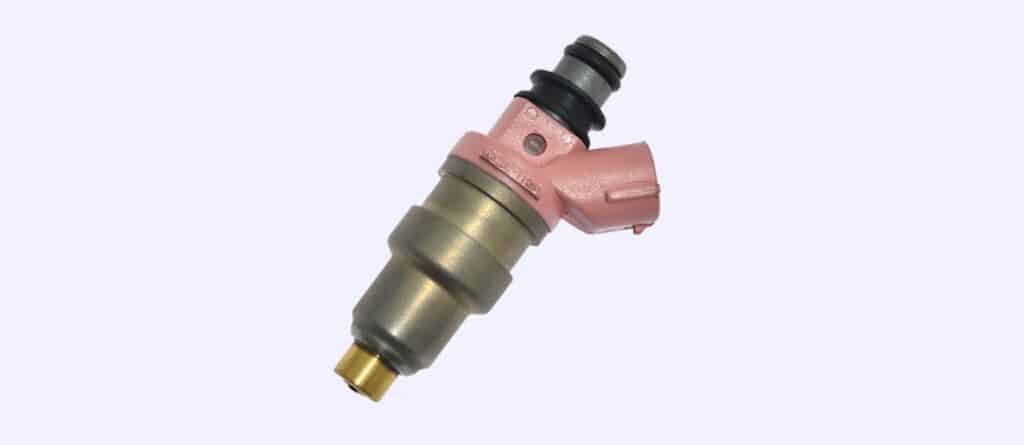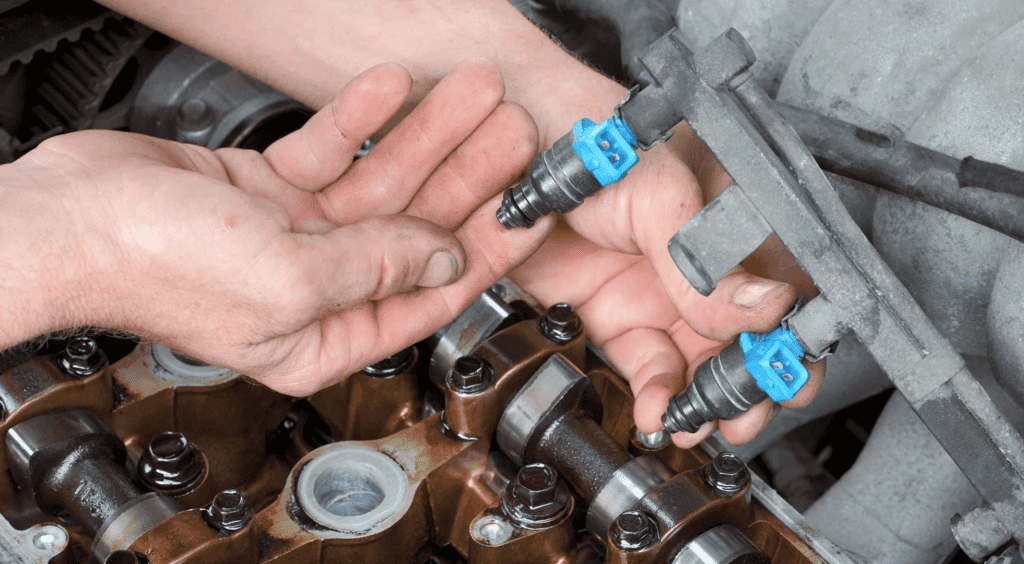What is a Fuel Injector Nozzle and its Function?
At the very heart of your car’s fuel system, you will find the fuel injector nozzle. With the precision of a maestro, it delivers fuel to your engine in a finely atomized mist to ensure optimal combustion. Ensuring efficient performance, better fuel economy, and reduced emissions, the fuel injector nozzle holds a pivotal role in your vehicle’s operation.
How Much Will it Cost to Service a Fuel Injector Nozzle in Canada?
In Canada, servicing a fuel injector nozzle can cost you anywhere between $50 and $120 per injector. This estimate includes both parts and labour. While this might sound like a hefty investment, keep in mind that this process typically takes just 1 to 2 hours, and it can significantly enhance your vehicle’s performance.

What are the Symptoms of a Clogged or Faulty Fuel Injector Nozzle?
• Poor Engine Performance: If the injector nozzles are clogged or faulty, your engine may not receive the correct amount of fuel. This can lead to a decrease in engine performance, including power and acceleration.
• Rough Idle: A vehicle with a clogged or defective fuel injector nozzle may have an irregular, shaky or rough idle due to the uneven supply of fuel to the engine.
• Reduced Fuel Economy: Since clogged nozzles can prevent the proper amount of fuel from reaching the engine, the vehicle may consume more fuel than usual, leading to a decrease in fuel economy.
• Engine Misfires: If fuel injector nozzles are clogged or not functioning properly, they may not provide the appropriate fuel to the engine, causing misfires.
• Check Engine Light: A faulty fuel injector nozzle can trigger the check engine light on your dashboard. It’s important to get the vehicle inspected if this light comes on.
• Difficulty Starting: If your vehicle has trouble starting or doesn’t start at all, it could be due to faulty injector nozzles preventing fuel from reaching the engine.
• Unusual Engine Noises: Unusual noises like knocking or pinging may occur due to the improper fuel-air mixture in the engine caused by faulty fuel injector nozzles.
• Increased Emissions: A faulty fuel injector nozzle can cause a rich fuel mixture, resulting in increased vehicle emissions and a potential failed emissions test.
How Often Should Fuel Injector Nozzles be Serviced?
Typically, fuel injector nozzles should be serviced every 15,000 to 30,000 miles. However, this interval can vary depending on the fuel type, driving conditions, and the specific make and model of your vehicle.
How Does a Fuel Injector Nozzle Become Clogged or Defective?
• Poor Quality Fuel: Using low-quality fuel can lead to deposits that can clog the injector nozzles. These deposits can build up over time and restrict the flow of fuel.
• Infrequent Servicing: Lack of regular maintenance and servicing can lead to a buildup of dirt and grime inside the injector nozzles, causing them to clog or malfunction.
• Normal Wear and Tear: Over time, the components of the fuel injector nozzle can wear down, which can affect their functionality. Normal operation over many miles can gradually lead to a decrease in performance and eventual failure.
• Engine Heat Soak: After shutting down a hot engine, the remaining heat can cause fuel residue in the injectors to evaporate, leaving behind solid deposits that can clog the nozzles.
• Fuel Contaminants: Dirt, rust, or other particles in the fuel can become lodged in the injector nozzle, leading to clogs and potential damage. This is more likely if the vehicle’s fuel filter is not doing its job properly.
• Corrosion: Exposure to moisture and certain chemicals can cause the components of the injector nozzle to corrode over time, affecting its performance and lifespan.
How Can a Clogged or Faulty Fuel Injector Nozzle Affect Engine Performance?
• Reduced Fuel Efficiency: A clogged or faulty fuel injector nozzle can compromise the fuel-air mixture, reducing your vehicle’s fuel efficiency. You may notice a decrease in gas mileage as more fuel is consumed for the same distance.
• Poor Acceleration: The clog or fault can restrict the flow of fuel into the engine, leading to reduced power and sluggish acceleration.
• Misfires and Rough Idle: Inconsistent fuel delivery can lead to engine misfires and a rough idle, as not all cylinders are firing correctly or receiving the right amount of fuel.
• Increased Emissions: If the fuel-air mixture is too rich due to a faulty injector nozzle, it can lead to increased emissions, specifically carbon monoxide, which could cause the vehicle to fail an emissions test.
• Damage to the Engine: Over time, poor fuel delivery can lead to significant engine damage, including overheating and wear on the engine’s components. This can result in costly repairs down the line.
• Hard Starting: A clogged or faulty fuel injector can lead to hard starting, where the vehicle takes longer than usual to start up, as it struggles to get the necessary fuel for ignition.

Is it Safe to Drive with Clogged or Faulty Fuel Injector Nozzles?
Can you still drive your car when your fuel injector nozzles are clogged or faulty? Technically, yes, but it’s far from advisable. A clogged or defective fuel injector nozzle can wreak havoc on your engine’s performance and stability. The degraded combustion process that results from an impaired fuel injection can compromise your vehicle’s efficiency, leading to an array of performance issues.
In more severe cases, you may notice hard starting, rough idling, or even a loss of power during acceleration. These symptoms not only make for an uncomfortable and unpredictable driving experience, but they can also cause undue wear and tear on your engine over time. It’s also worth noting that driving with a compromised fuel system could lead to increased emissions, landing you in hot water during emissions testing. So while your vehicle might still be drivable, the risks and potential for damage far outweigh the convenience of postponing a necessary service or repair.
How Can I Make My Fuel Injector Nozzles Last Longer?
• Use high-quality fuel to reduce the chance of contamination
• Regularly service your vehicle according to the manufacturer’s recommendations
• Avoid aggressive driving habits like hard accelerations and decelerations
Can a Mobile Mechanic Perform Fuel Injector Nozzle Servicing?
Yes, a mobile mechanic can certainly handle fuel injector nozzle servicing. With their expertise and equipped mobile shop, they can come to you, making the process convenient and hassle-free.
Conclusion: Importance of Regular Fuel Injector Nozzle Servicing
In conclusion, maintaining a regular servicing schedule for your fuel injector nozzles is critical for preserving your vehicle’s performance, fuel efficiency, and longevity. Although the cost might seem high initially, in the long run, this preventative maintenance can save you significant expenses on fuel and potential repair costs. So don’t delay, schedule your fuel injector nozzle service today!
Next Steps
Book Your Fuel Injector Nozzle Servicing
The service most frequently booked by those who read this article is Fuel Injector Nozzle Servicing. Uchanics’ expert technicians make the process even more convenient by bringing the service right to your doorstep. We perform this job at your home or office, covering over 40 cities in Ontario, including Oshawa, Ajax, Toronto, Scarborough, Mississauga, Brampton, and more. Our commitment to excellence has earned us more than 700 glowing 5-star reviews. Choose Uchanics for your Fuel Injector Nozzle Servicing and experience unparalleled convenience and top-quality service.
